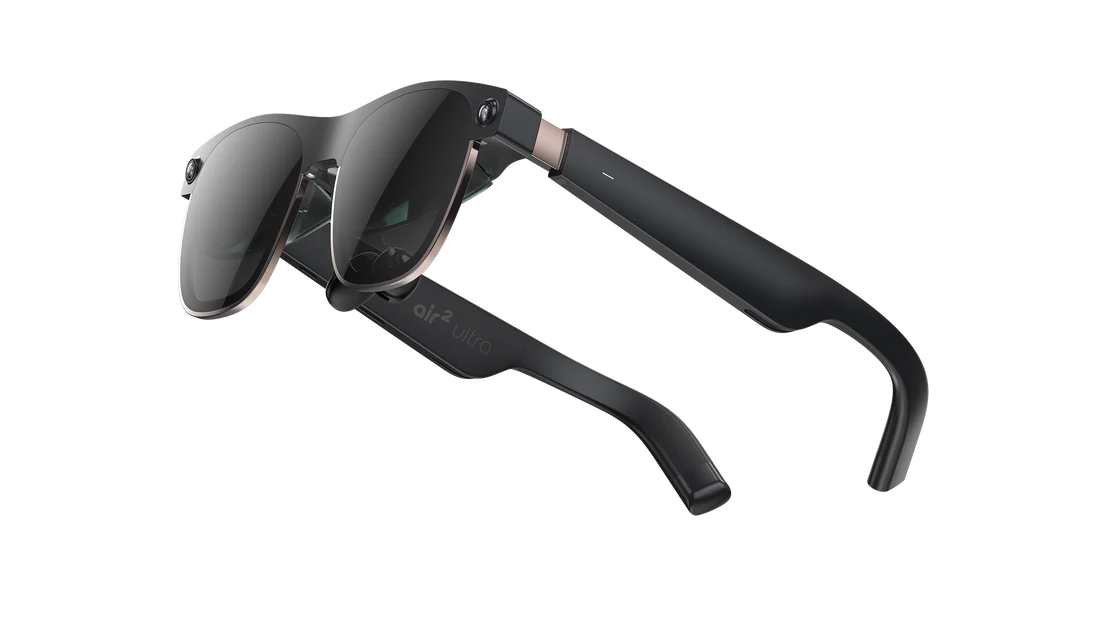In the ever-evolving realm of augmented reality (AR), Xreal’s latest release, the Air 2 Ultra, emerges as a formidable contender against the highly anticipated Apple Vision Pro. Unveiled at CES 2024, these AR glasses boast groundbreaking features, setting the stage for a compelling alternative in the competitive landscape.
Also Read: Humane’s ChatGPT-Powered Ai Pin Set to Revolutionize Wearable Tech in 2024
The AR Revolution Continues
Xreal, formerly known as Nreal, made waves at CES 2024 with the introduction of the Air 2 Ultra. Building on the success of its predecessor, the Nreal Light, these AR glasses promise a transformative experience by incorporating six degrees of freedom (6DoF) spatial tracking and hand tracking capabilities. The company aims to redefine spatial computing, allowing virtual objects to seamlessly integrate with the real world.
Unveiling the Technological Marvel
Weighing in at a mere 80 grams, the Air 2 Ultra features a wider 52-degree field of view (FOV) and a remarkable 42-pixel-per-degree sharpness within a sleek titanium package. Xreal boldly positions the $699 Air 2 Ultra as a compelling alternative to Apple’s $3,499 Vision Pro, emphasizing affordability without compromising on advanced features.

Power and Connectivity
Unlike standalone mixed reality headsets, the Air 2 Ultra relies on external computing units such as smartphones, computers, or Xreal’s Beam module through USB-C. This approach ensures flexibility and compatibility with a range of devices, including Samsung Galaxy S23 or S22, iPhone 15, and various Mac or Windows machines running Xreal’s Nebula launcher.
Also Read: Samsung All Set to Launch World’s Smartest AI Phone in Jan; Know Everything
Immersive Experience and Enhanced Privacy
The Air 2 Ultra’s front layer boasts three electrochromic dimming levels for heightened immersion without the need for a physical shield. Additionally, directional audio technology enhances privacy, while dual microphones facilitate seamless voice interaction. The Sony micro OLED panels with 1080p resolution per eye, a refresh rate of up to 120Hz, and brightness of up to 500 nits contribute to a captivating visual experience.

Targeting Developers and Consumers
While the $699 price tag places the Air 2 Ultra in a competitive position, Xreal acknowledges its primary focus on developers initially. The upcoming Unity-based NRSDK 2.2, set to launch alongside the shipping of these glasses in March, will empower developers with improved hand tracking, gesture recognition, spatial anchors, and depth mesh capabilities. Xreal recognizes the importance of building a robust mixed reality ecosystem before capturing widespread consumer attention.
Also Read: CES 2024 Preview: A Sneak Peek into the Future of AI & Tech
Our Say
Xreal’s Air 2 Ultra signifies a significant stride in the AR landscape, challenging established players like Apple. The emphasis on affordability, coupled with cutting-edge technology, positions these glasses as a compelling choice for developers and, eventually, consumers seeking an immersive AR experience. As the AR revolution unfolds, Xreal’s commitment to innovation places it at the forefront of shaping the next generation of mixed reality experiences.
Follow us on Google News to stay updated with the latest innovations in the world of AI, Data Science, & GenAI.




